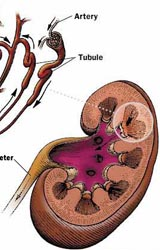Acute Kidney Failure
What is acute Kidney Failure?
It is the sudden loss of the kidney’s main function. It occurs when the kidneys stop working over a period of time. Acute kidney failures sometimes occur after complicated surgery, severe injury or when blood flow to your kidneys is disrupted. This could be life threatening and requires intensive treatment.
What are the causes?
Prerenal failure
 Prerenal failure is when the kidneys do not receive enough blood to flow through them.
Prerenal failure is when the kidneys do not receive enough blood to flow through them.
Low blood pressure severe bleeding or infections in the bloodstream
Problems with the heart functioning properly include heart attacks or heart failure.
Low blood volume caused mainly by dehydration
Postrenal failure
Postrenal failure is often caused by something blocking elimination of urine produced by the kidneys. It is the rarest cause of acute kidney failure.
Ureter obstruction
Bladder obstructions
Renal Failure
Renal failure is when your kidneys stop working.
Low blood flow
Medicines
Poisons
Infections
Bladder obstructions
What are the symptoms?
Decreased urine production
Body swelling
Abdominal pain
Diarrhea
High blood pressure
Feeling anxious, restless, or sleepy
Nausea, vomiting
Seizures, coma (in severe cases)
What are the treatments?
Once the cause is found, the goal of treatment is to restore kidney function and prevent fluid and waste from building up in the body while the kidneys heal.
Your food and drinks may be limited to the amount of urine you can produce. Your diet may be high in carbohydrates and low in protein, salt and potassium.
Calcium, glucose/insulin, or potassium will be given through a vein to help avoid dangerous increases in blood potassium levels.
You may take antibiotics to prevent or treat infections. You also may take other medicines to get rid of extra fluid and keep your body’s minerals in balance. Diuretics such as water pills may be used to help the kidneys lose fluid.
Dialysis may be done to help remove toxins and excess fluids from your body while your kidneys heal.
Prevention
Acute kidney failure is impossible to prevent but you can limit your alcohol and drugs including over-the-counter pain medications such as aspirin, acetaminophen and ibuprofen in your body.